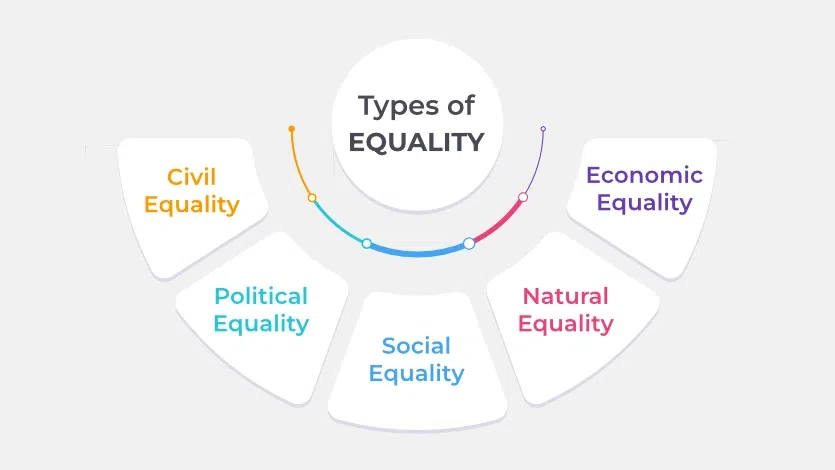
|
|
Equality: Liberty and equality are two of the most fundamental keywords of democracy and the Indian constitution. In the case of India, both liberty and equality are mentioned in the Preamble of the Constitution and equality is one of the four primary keywords of polity in India, followed by other important terms like Justice, Liberty, and Fraternity, as they are defined in the Preamble of Indian constitution. Let us learn more about the types of equality. Table of Content  Types of Equality
History of EqualityThe deep rooted causes for emergence of equality echoes in the Indian constitution, has been due to the deep rooted problems of caste marginalisation and it long remained as an backward as well as undeveloped part, rooted in social stigmas and subordination, which resulted in categorisation like OBCs, SCs and STs. Features of EqualitySome important features of equality are as follows:
Types of EqualitySome important types of equality are as follows: Natural EqualityDespite the fact that persons differ in terms of physical characteristics, psychological traits, mental aptitude, and capacities, all humans ought to be treated equally. All must be taken into account in order to enjoy all human rights and freedoms. Social EqualityEqual rights and possibilities for development for all classes of people without discrimination, such as civil rights, freedom of speech, property rights, and equal access to social goods and services, are all examples of social equality. It also encompasses notions such as health equity, economic equality, and other social safeguards. It also encompasses equal chances and responsibilities, implying that it affects the entire society. The lack of legally enforced social class or caste barriers, as well as discrimination motivated by an inalienable component of a person’s identity, is required for social equality.
Civil EqualityIt is defined as granting all persons and societal groupings equal rights and freedoms. In the eyes of the law, everyone is treated equally. The enjoyment of similar civic liberties and civil rights by all citizens is referred to as civil liberty. Individuals should be treated fairly in the legal system. Superiors and inferiors, rich and poor, caste and creed, colors and race, clans, and tribes, groupings and classes all deserve equal treatment. In England, the rule of law is in effect, and everyone is treated equally in the eyes of the law. Everyone is treated equally under the rule of law. Political EqualityEqual opportunities for everybody to participate in the political process is what it is referred to. This entails the principle of granting all citizens equal political rights in exchange for some universal qualifications. All citizens should have the same political rights, have a similar voice in the government’s operations, and have equal opportunity to actively participate in the country’s political life and concerns. Political equality ensures that all citizens have access to the same political rights. A tool for this objective is the Universal Adult Franchise. Universal adult suffrage has been adopted in India. The United Kingdom, the Soviet Union, the United States of America, France, and a number of other countries have adopted similar provisions. Economic EqualityEconomic equality does not imply that everyone receives the same treatment, rewards, or pay. It refers to providing all people with equal and enough opportunities to work and earn a living. It also implies that everyone’s basic needs should be met before the unique needs of a select few are met. The gap between the rich and the poor should be as small as possible. The distribution of wealth and resources in society should be equitable. Political and economic equality are inextricably linked. Professor Laski emphasized the need for economic equality. “Political equality is only real if it is accompanied by virtual economic liberty and political power.” Economic equality, in general, refers to the availability of equal opportunity to all people so that they might advance economically. This is only possible in Socialism, not in Capitalism. Capitalism should be replaced by Socialism from now on. Legal EqualityLegal equality is described as equality before the law, equal submission to the same legal code, and equal chance for all to have their rights and freedoms legally protected. A rule of law should exist, and all laws should be equally binding. In all of these ways, equality must be ensured in every society. Education and Opportunity EqualityEquality of opportunity and education implies that the state should provide equal and comparable opportunities to all citizens. Everyone should be able to obtain an education on an equal basis. They should have the same possibilities to grow as individuals. Any form of discrimination, whether racial or otherwise, should be avoided. There should be no distinction between caste and creed, race and color, or rich and poor. In India, everyone is given equal opportunity and has equal access to education. Related LinksFAQs on Types of Equality1. Are there different types of equality?
2. What are the elements of equality?
3. What are the 7 types of equality?
4. What are the two concepts of equality?
|
Reffered: https://www.geeksforgeeks.org
| Class 7 |
| Related |
|---|
| |
| |
| |
| |
| |
Type: | Geek |
Category: | Coding |
Sub Category: | Tutorial |
Uploaded by: | Admin |
Views: | 11 |